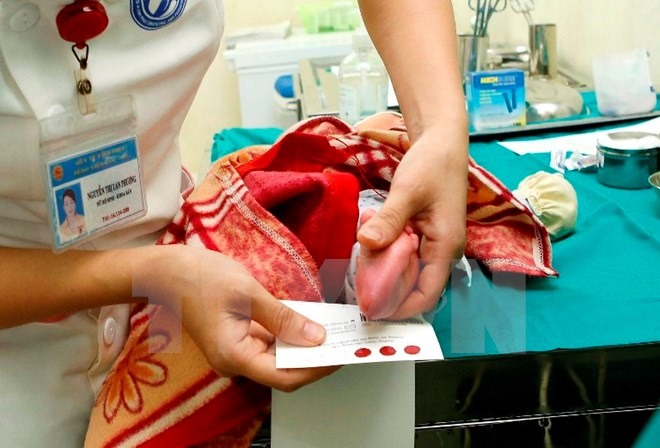 Society
Society

Early diagnosis can help to save lives of children with primary immunodeficiency, doctors suggested at the second meeting with patients suffering immune system disorder in HCM City last week.
 |
| Heel pricks help screen health of newborns. — VNA/VNS Dương Ngọc |
HCM CITY — Early diagnosis can help save the lives of children with primary immunodeficiency, doctors said in HCM City last week at a meeting with parents of patients with the disorder.
PTD, a seven-year-old resident of Đức Hòa District in the Mekong Delta province of Long An, was normal until he reached three. His mother told online newspaper vietnamplus.vn that they noticed a tumor growing on his right leg. A year after it was surgically removed, PTD kept falling sick and losing weight.
A bone marrow examination done at Children’s Hospital No 1 showed that he had primary immunodeficiency.
PTD’s limbs have been shrinking as the disorder worsens. Within this year, the disease has spread to his middle ears, causing hearing loss and making him partially deaf.
“We spend VNĐ12 to 15 million (US$528 – 660) every month on his medicines and treatment. When my son could no longer enjoy free healthcare for children under six, the local authorities supported us in getting insurance for people with disabilities. Otherwise, we could not be able to afford the treatment,” said PTD’s mother.
Lê Thị Minh Hương, deputy director of the National Children’s Hospital, said that from 2010 to 2016, their immune-allergy-joint department received 10 to 15 cases of primary immunodeficiency every year.
She said that the disease was caused by hereditary or genetic defects wherein not enough immune cells are being generated.
It is estimated that one in 2000 people suffer from different types of immune system disorders. Although some disorders are present at childhood, the disease can affect anyone at any age. Patients with immunodeficiency are more susceptible to infections that can lead to serious complications and even death.
Speaking at the meeting, Hương called for more favourable public health policies for patients with primary immunodeficiency.
“Patients suffering immune system disorders need lifelong treatment to maintain their health. Therefore, it is urgent that policymakers adopt policies and insurance packages for those patients who are above 16, in order to ease their financial burden,” she said.-VNS
Doctors say parents should bring their children to medical facilities for diagnosis when any of the following symptoms are seen:




